Sri Rawat emphasized importance of modern technology-based farming systems, agro-forestry and fisheries in the hill region
Dehradun, 2 April, 2011
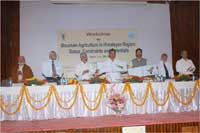 Shri Harish Rawat, Union Minister of State for Agriculture and Food Processing Industries inaugurated a two-day workshop on “Mountain Agriculture in Himalayan Region: Status, Constraints and Potentials” organized by the Central Soil and Water Conservation and Research and Training Institute, Dehradun in association with HESCO here today.
Shri Harish Rawat, Union Minister of State for Agriculture and Food Processing Industries inaugurated a two-day workshop on “Mountain Agriculture in Himalayan Region: Status, Constraints and Potentials” organized by the Central Soil and Water Conservation and Research and Training Institute, Dehradun in association with HESCO here today.
Sri Rawat suggested that water harvesting by storing rain water into small tanks has immense scope in the entire Himalayan region. The stored water can be effectively used to irrigate various crops by drip and sprinkler systems where people’s participation through formation of Water Associations/ Groups can play a pivotal role as demonstrated in many other places. He also emphasized on the importance of modern technology-based farming systems, agro-forestry and fisheries in the mountainous region. Hence, the extension mechanism must be strengthened further to disseminate these technologies to the farmers’ especially to the women as they are the most important part of mountain agriculture. He cautioned that in future, the mountain agriculture will be more challenging due to adverse impacts of climate change.
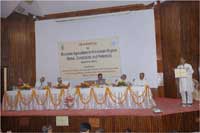
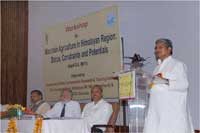
Sri Trivender Singh Rawat, Minister of Agriculture, Govt. of Uttarakhand also emphasized on mountain agriculture with particular mention on the scope of water harvesting, high yielding varieties and land consolidation in the hilly region.
Sri Pradeep Tamta, MP said that the top soil loss and loss of fertile agricultural lands due to stream bank cutting is a major problem in Himalayan region.
Dr. S Ayyappan, Secretary, DARE and Director General, Indian Council of Agricultural Reseach while delivering presedential address pointed out that as the soil fertility level is very low in mountainous region, therefore, promoting organic farming alone may cause big loss to farmers and hence major focus should be on integrated nutrient management and application of balanced fertilizers rather than organic farming.
Dr. A.K. Singh, Deputy Director General, NRM, ICAR in his introductory remarks said that loss of plant nutrients through soil erosion and soil acidity are major constraints in the entire Himalayan region.
Dr V.N. Sharda, Director, Central Soil and Water Conservation and Research and Training Institute, Dehradun highlighted that primary objective of the workshop is to have in-depth deliberations and brain storming on the issues pertinent to agricultural development in the Himalayan region and evolve appropriate strategies and policies for long term sustainable development of agriculture in the region without degradation of natural resources.
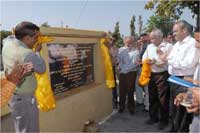
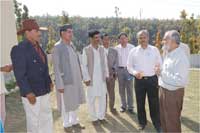
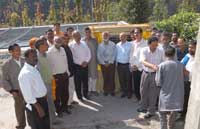
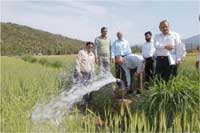
Dr. Ayyappan also visited the site of the project on livelihood security in the rainfed areas of north-western Himalayas in a cluster of four villages of Vikasnagar Block of District Dehradun. He also inaugurated Participatory Water Resource Development Project undertaken in the area with active participation of the local community. Under this project, a pipeline of about 3.5 km length has been laid out for diverting water from a perennial source to the command area which was totally rainfed with very low productivity. With this irrigation facility, overall, there has been a 3-fold increase in the yield which has ensured food security to the farmers. Dr. Ayyappan appreciated the project activities and suggested measures to further imporve the impact of the project.
(Source: NAIP Sub-Project on Mass Media Mobilization, DKMA with inputs from CSWCRTI, Dehradun)








Like on Facebook
Subscribe on Youtube
Follow on X X
Like on instagram